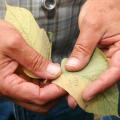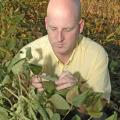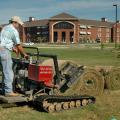Feature Story from 2007
By Patti Drapala
MSU Ag Communications
MISSISSIPPI STATE -- Hurricanes Katrina and Rita packed a one-two punch that washed away the Gulf Coast landscape, but a flood of volunteerism generated by the Mississippi Master Gardener Association aims to restore what the storms destroyed.
The association has set Oct. 24, 25 and 26 as special workdays for Master Gardeners throughout Mississippi and other states to “swarm” the Coast for Operation Rejuvenation, an ongoing project to refurbish public landscapes in Hancock, Harrison and Jackson counties.
MISSISSIPPI STATE -- Like most seventh-graders, Calina Young's choice of future careers changes from day to day. Yesterday it was a nurse, but today it's a Web designer.
Young was one of 45 Mississippi 4-H members ages 14-18 taking part in a technology camp at Mississippi State University this summer. The senior 4-H members, along with eight volunteer leaders, focused on various aspects of technology, including Web design, digital photography, Flash animation and Geographic Information Systems, or GIS.
MISSISSIPPI STATE -- Milk prices are strong, but hot temperatures and high production costs are making it harder for dairy farmers to turn a profit.
Class I (fluid) milk prices are at all-time record levels, near $25 per hundredweight, which exceeds the previous record set in June 2004 by about 60 cents.
As extremely hot temperatures dominate the state's weather, milk production will decrease from the stressed cattle, and dairy producers will have less milk available to take advantage of those record prices.
MISSISSIPPI STATE -- Women who work in farming businesses are often the sole decision-makers, and a new three-day program has been created to help them make the best choices.
The Mississippi State University Extension Service, the Mississippi Farm Bureau Federation, and Mississippi Department of Agriculture and Commerce are sponsoring three business management seminars for farmwomen called Mississippi Women in Agriculture – Annie’s Project.
MISSISSIPPI STATE -- When Lauren Beatty decided to go to a football game rather than visit the Massachusetts Institute of Technology, she worried she made the wrong choice.
Then Mississippi State University beat the University of Alabama at Tuscaloosa 24-16. Beatty was on the sidelines as a Bulldog cheerleader in that November 2006 game.
“The moment was priceless,” she said. “The Alabama fans left the stadium early because they knew they had lost.”
While sports won out over academics that time, that is not the norm for Beatty.
MISSISSIPPI STATE -- Most Mississippi farmers have never seen Asian soybean rust in their fields and hope to never encounter the yield-robbing disease in their crop.
STONEVILLE -- Mississippi State University Extension personnel found Asian soybean rust on soybeans in Mississippi for the first time in 2007 on Aug. 10.
Retired MSU Extension agent Lee Taylor located the disease on soybeans in a sentinel plot in Pearl River County in south Mississippi. Two days later, Tom Allen, MSU Extension plant pathologist for the Delta, found the disease on soybeans in a sentinel plot at Stoneville in Washington County in north Mississippi.
STONEVILE -- Although Mississippi State University Extension personnel found Asian soybean rust in the state’s largest soybean-producing area, the Delta, they anticipate less than 20 percent of the crop is at risk from the potentially devastating disease.
“We’re not too concerned at this point about having found soybean rust in the Mississippi Delta,” said Billy Moore, Extension plant pathologist emeritus.
MISSISSIPPI STATE -- From the catfish in the smallest pond to the tree with the deepest root system, Mississippi's agricultural commodities are feeling the heat.
Catfish, poultry, livestock, field crops and timber are struggling through the hottest days of summer, much like the farmers who grow them. The damage from heat stress can be seen in a matter of minutes in some of the most vulnerable animals, catfish and poultry; in days or weeks with field crops or livestock; or in months or years in the case of timber.
By Patti Drapala
MSU Ag Communications
MISSISSIPPI STATE -- A series of career camps with the goal of motivating middle school students to become future Delta medical professionals is raising interest from youth, parents and educators in the region.
The camps are part of Delta Futures, a cooperative project between the Mississippi State University Extension Service and the Delta Health Alliance. The alliance, founded in 2001, addresses issues surrounding the shortage of medical facilities and personnel in the region.
MISSISSIPPI STATE -- Hot, dry weather has taken a toll of many things in home lawns this summer, but the list does not include mosquitoes.
While mosquito populations in general are much lower in dry weather, the species most commonly found around homes usually does not decline significantly, said Mississippi State University Extension Service entomologist Blake Layton.
MISSISSIPPI STATE -- Summer's heat tends to drive people indoors, and it can do the same for some unwanted pests.
Mississippi is home to three kinds of large roaches that reach 1-2 inches long as adults. Blake Layton, entomologist with the Mississippi State University Extension Service, said the American, Smoky Brown and Brown cockroaches are all found in the state and look very similar. These winged insects can fly, but they usually don't unless provoked.
MISSISSIPPI STATE -- Sod producers could not grow grass fast enough last spring to keep up with demand, but late-summer sales have plummeted because of enormous water demands during the hot, dry conditions.
Wayne Wells, turf specialist with the Mississippi State University Extension Service, said 2007 has been a good year for growing sod across the state, and sales were strong during the first months of the year. At the same time, water demands and energy costs have added to the cost of production.
By Andi Cooper
College of Forest Resources
MISSISSIPPI STATE -- Part of the damage after Hurricane Katrina roared ashore across the Gulf Coast on Aug. 29, 2005, was 5 million acres of broken timber.
The U.S. Forest Service estimated that the volume of damaged wood across the Southeast was enough to build 800,000 single-family homes.
Researchers at Mississippi State University are measuring the effects of Hurricane Katrina on the structure, performance, capacity and future of the region's lumber industry.
STARKVILLE -- Cattle producers and horse owners can take part in certified training through the upcoming Master Stockman programs at Mississippi State University.
The Mississippi Master Horseman and Mississippi Master Cattle Producer programs will take place Sept. 14-15 at the Mississippi Horse Park, located adjacent to MSU’s South Farm near Starkville. Each program will offer different tracks to accommodate specific interests and experience levels -- basic and advanced. The cattle tracks will address cow-calf production and stocker cattle management.
MISSISSIPPI STATE -- A one-day workshop for farmers, landowners and resource managers will provide the tools to start and manage a natural resource enterprise.
The Sept. 18 event will begin at 8 a.m. It will be held on privately owned property south of Brandon, just off of Highway 18 in Rankin County.
MISSISSIPPI STATE -- Any Mississippian can turn a sandwich and a trip to the county Extension office into a learning experience.
Each Thursday from noon until 1 p.m., county Extension offices receive Quick Bites live, interactive video feeds from Mississippi State University.
There is a new topic each week, and the topics are as varied as the state of Mississippi, said Extension distance education coordinator Susan Seal.
MISSISSIPPI STATE -- Corn in the Delta is producing record yields because it was irrigated or caught timely rains, but corn elsewhere in the state struggled to produce low yields because of the drought.
The U.S. Department of Agriculture is predicting the nation will produce the largest corn crop in history. Mississippi's corn acreage increased from 340,000 acres in 2006 to 980,000 acres in 2007. The Delta, where most of this season's corn was grown, is experiencing record yields.
MISSISSIPPI STATE -- A “Southern girl” with roots in north Florida is the new specialist in Family Education and Policy for the Mississippi State University Extension Service.
Tabitha Staier, who began her position Aug. 1, is responsible for the development of programs that promote healthy relationships for individuals, couples and families in Mississippi. She will work with county Extension personnel to evaluate needs of couples and families, and implement relevant family-related programs in those areas.
MISSISSIPPI STATE -- An animal scientist with expertise in herd reproduction is the new beef cattle specialist with the Mississippi State University Extension Service.
Justin D. Rhinehart, who began his duties July 1, has been working with the state’s beef cattle producers to maintain and develop Extension programs that improve feeder calf marketing, stocker cattle management and heifer development.
“I saw an attractive opportunity presented by Mississippi State to work in an area where beef cattle are an important part of the economy,” he said.
Pages
Feature Story Archive
- 2025 (63)
- 2024 (116)
- 2023 (114)
- 2022 (112)
- 2021 (104)
- 2020 (140)
- 2019 (126)
- 2018 (141)
- 2017 (197)
- 2016 (240)
- 2015 (319)
- 2014 (355)
- 2013 (371)
- 2012 (343)
- 2011 (246)
- 2010 (236)
- 2009 (229)
- 2008 (188)
- 2007 (210)
- 2006 (199)
- 2005 (224)
- 2004 (215)
- 2003 (228)
- 2002 (176)
- 2001 (184)
- 2000 (188)
- 1999 (180)
- 1998 (178)
- 1997 (188)
- 1996 (58)
- 1995 (36)









